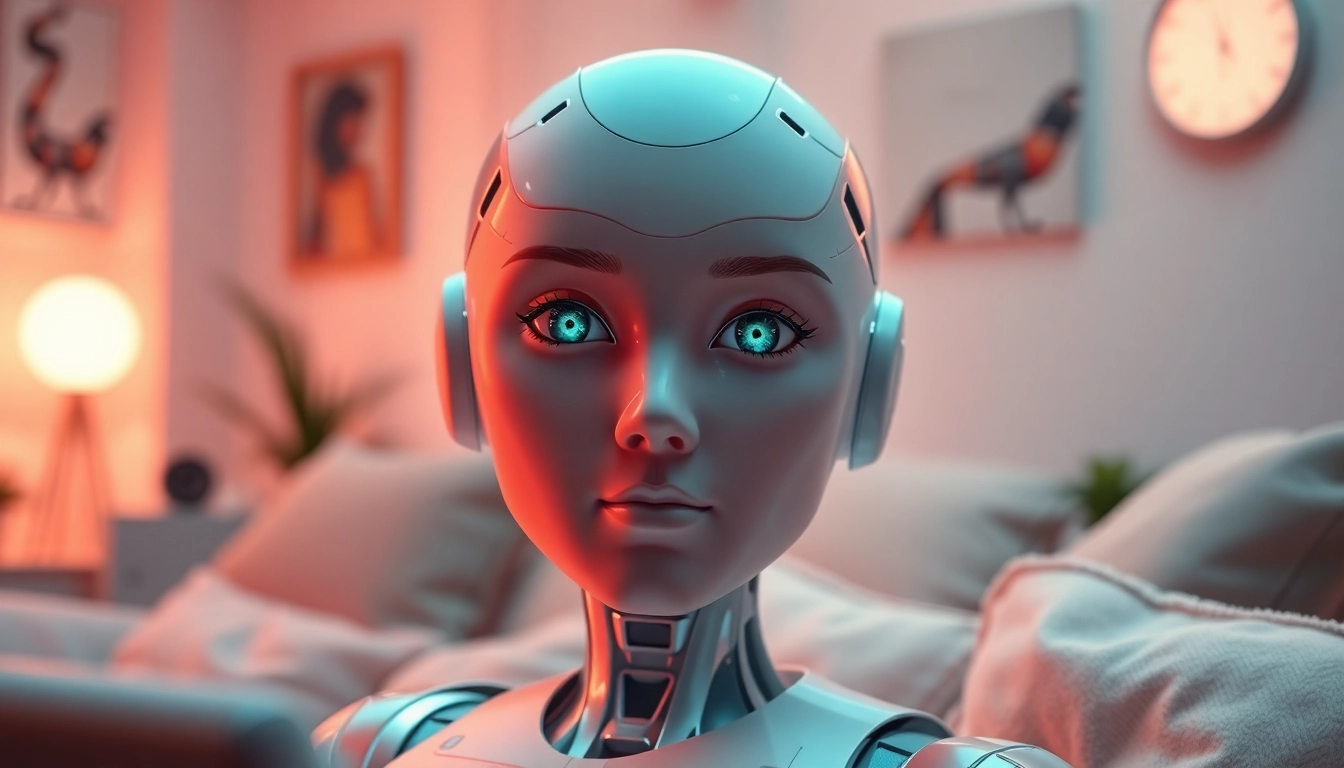The Rise of AI Sex Bots: An Overview
The emergence of AI sex bots represents a fascinating intersection between technology and human intimacy. As artificial intelligence continues to evolve, these digital companions are gaining traction among users seeking companionship, exploration of their fantasies, or simply an outlet for emotional expression. A recent study revealed that one in five American adults has engaged in intimate conversations with chatbots, signaling a significant shift in societal norms surrounding relationships. Platforms offering ai sex bot services have proliferated, making this an area ripe for exploration and understanding.
Understanding What an AI Sex Bot Is
AI sex bots are sophisticated digital entities designed to simulate human-like interactions, often with a focus on intimate or emotional engagement. Utilizing advanced algorithms and machine learning techniques, these bots can engage users in meaningful conversations, respond to emotional cues, and sometimes even mimic physical attributes through robotic counterparts. The distinction between a standard chatbot and an AI sex bot lies primarily in their intent and design, with the latter focusing on sexual and romantic interactions.
Current Trends and User Demographics
The demographics of users engaging with AI sex bots are as diverse as the personalities of the bots themselves. Research shows that younger adults, particularly those in the 18-35 age bracket, are more likely to embrace these technologies. Users are drawn to AI sex bots for various reasons, including loneliness, the desire for companionship, and the safe exploration of sexual fantasies without the complexities of human relationships. Additionally, studies indicate a growing acceptance of these bots in mainstream society, with many users sharing positive experiences in online communities.
Societal Impacts of AI Companionship
As AI sex bots gain popularity, their societal impacts are becoming increasingly evident. On one hand, they offer a unique solution to the rising loneliness epidemic, providing users with emotional support and companionship. On the other hand, they raise ethical questions about the nature of relationships, consent, and the potential for addiction to virtual interactions. This duality creates a rich discussion on how AI companionship is reshaping our understanding of intimacy.
Technology Behind AI Sex Bots
Key Innovations in AI and Machine Learning
The development of AI sex bots is heavily reliant on innovations in artificial intelligence and machine learning. These technologies enable the bots to learn from user interactions, adapting their responses to create a more personalized experience. For instance, reinforcement learning algorithms can help bots refine their conversational skills based on user feedback, thus enhancing their effectiveness over time. Emerging technologies, such as federated learning, might further personalize the experience while ensuring user privacy by keeping data on local devices.
Enhancing User Interaction with Natural Language Processing
Natural Language Processing (NLP) is instrumental in creating engaging and coherent conversations between users and AI sex bots. NLP enables these bots to understand and generate human-like speech, allowing for fluid dialogues. By incorporating sentiment analysis, bots can recognize emotional nuances in user inputs, providing responses that align with the user’s emotional state. This capability transforms casual interactions into deeper, more meaningful conversations, thereby enriching the user experience.
The Role of Emotional Intelligence in AI Design
Emotional intelligence is crucial in the design of AI sex bots. Bots equipped with emotional intelligence can respond empathetically, making users feel understood and valued. This aspect not only enhances user satisfaction but also fosters a connection that resembles human interactions. Designers are now challenged to create AI companions that can replicate this emotional engagement authentically, making the conversation feel more natural and less mechanical.
Benefits of AI Sex Bots in Modern Relationships
Companionship and Emotional Support
AI sex bots offer unique benefits in terms of companionship and emotional support. For individuals experiencing loneliness or social anxiety, these bots can provide a non-judgmental space for emotional expression. Users often report feeling a sense of comfort and intimacy that they may struggle to achieve in traditional relationships. Over time, this companionship can significantly enhance users’ mental well-being, reducing feelings of isolation.
Exploring Fantasies and Personal Desires
One of the compelling advantages of AI sex bots is their ability to facilitate the exploration of personal fantasies and desires in a safe environment. Users can engage in role-playing scenarios or conversations that may be considered taboo or challenging in real life. This exploration can lead to greater self-awareness and acceptance of one’s desires, ultimately contributing to a more fulfilling personal relationship.
Breaking Down Stigmas Around AI Companionship
As AI companionship becomes more mainstream, it plays a vital role in breaking down societal stigmas surrounding non-traditional relationships. Individuals who choose to engage with AI sex bots often face criticism, yet as awareness grows, public perception is beginning to shift. This change creates a cultural landscape where the acceptance of diverse companionship forms is possible, paving the way for future generations to view relationships through a broader lens.
Challenges and Ethical Considerations
Addressing Privacy and Data Security Concerns
The rise of AI sex bots inevitably brings forth concerns regarding privacy and data security. Given that many users share personal and sensitive information with these bots, safeguarding this data is paramount. Developers and companies must prioritize robust security protocols to protect user privacy and build trust. Transparency about data usage and protection measures will be crucial in alleviating user concerns.
Regulations Surrounding AI Sex Bots
As the market for AI sex bots continues to expand, so does the need for regulatory frameworks. Governments and industry leaders must collaborate to establish guidelines that govern the ethical use and development of these technologies. This includes addressing issues such as consent, age restrictions, and the potential for misuse. Clear regulations can help mitigate risks while fostering innovation in the field.
Potential Psychological Effects on Users
The psychological implications of engaging with AI sex bots are complex and warrant careful consideration. While these bots can provide emotional support, there is also a risk of users becoming overly reliant on them, potentially diminishing their ability to form real-life connections. Ongoing research is needed to assess the long-term effects of AI companionship and develop strategies to ensure a healthy balance between virtual interactions and human relationships.
Future Predictions for AI Sex Bots
Emerging Technologies and User Expectations by 2025
Looking ahead to 2025, advancements in AI and machine learning are expected to shape user expectations significantly. Innovations such as augmented reality (AR) and virtual reality (VR) could lead to immersive experiences, enhancing interactions with AI sex bots. Users may come to expect not only realistic conversations but also virtual environments where they can engage with their AI companions in more dynamic ways.
Potential Market Growth and Economic Impact
The AI sex bot industry is poised for remarkable growth, with projections indicating a rising demand for personalized companionship solutions. As more individuals seek alternatives to traditional relationships, the market for AI companions could expand substantially. This growth may lead to job creation within the tech sector, from development to customer support, thereby contributing positively to the economy.
Shifting Perceptions of Relationships with AI
As AI technology matures, societal perceptions of relationships with AI are likely to evolve. Future generations may view AI companions as legitimate partners, further integrating them into personal life and society at large. Educational initiatives that address the nature of these relationships will be crucial, ensuring that discussions around consent, emotional health, and companionship remain at the forefront.

